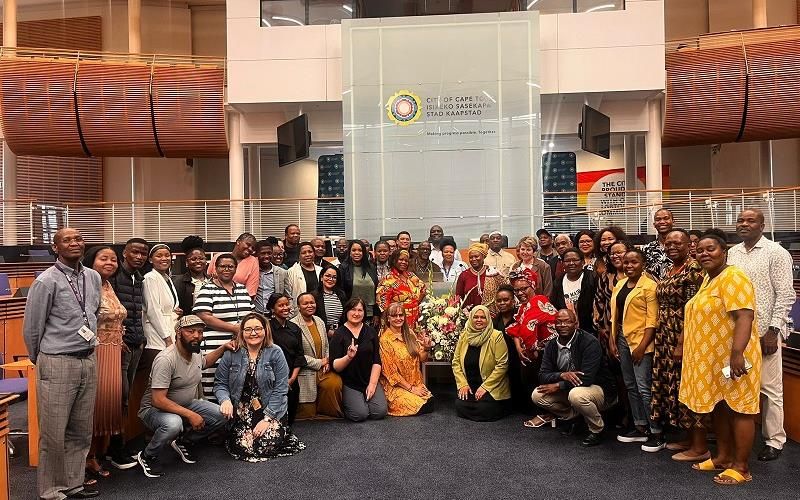On International Translation Day, the City of Cape Town and the Pan South African Language Board (PanSALB) collaborate to highlight the importance of translation services in removing communication barriers and fostering an inclusive, multicultural society. The partnership aims to acknowledge language professionals’ contributions to promoting dialogue and understanding and implement new technologies and systems to enhance translation services. The city is dedicated to offering services in the three official languages of the Western Cape and catering to residents’ language preferences, with expanded access through multilingual notices, signs, and advertisements. The initiative demonstrates the potential for cities worldwide to build inclusive, diverse communities through language and translation services.
Subtitle: Cape Town’s collaboration with PanSALB to recognize language experts and improve translation services in the community.
A Collaborative Effort: Cape Town and PanSALB Join Forces
On September 29, 2023, as the world celebrates International Translation Day, the City of Cape Town and the Pan South African Language Board (PanSALB) unite to acknowledge the essential function of translation services in removing communication hurdles. This year’s theme, “A world without barriers,” underscores the significance of communicating in the languages of the people we serve and fostering an inclusive, multicultural society.
Cape Town, a pioneer in the field of language practice and interpreting, organized a workshop attended by representatives from various government bodies and associations. The event honored language professionals for their vital contributions to promoting dialogue and understanding through their translation and interpreting services.
Alderman Theresa Uys, the City’s Mayoral Committee Member for Corporate Services, stresses the importance of acknowledging the language and culture of local residents. She highlights the successful collaboration with PanSALB in creating service delivery models and implementing new technologies and systems in translation services. This partnership aims to eliminate communication barriers within the city.
Catering to Citizens: Addressing Language Preferences
As Cape Town’s residents increasingly demand materials in their preferred languages, they make their voices heard through appropriate channels. Uys finds the city’s ability to cater to this growing demand highly encouraging.
The collaboration with PanSALB also paves the way for research projects to enhance customer engagement in the city and align with its inclusivity goals. Cape Town is dedicated to offering services in the three official languages of the Western Cape – English, Afrikaans, and isiXhosa – and connecting with customers in their language of choice. Language professionals are essential in ensuring that residents access the services they deserve and actively participate in community affairs.
The city provides an array of services, including interpreting at subcouncil, portfolio, and Council meetings, disciplinary hearings, and public participation sessions, as well as sign language interpreting when needed. Residents can interact with the city in any of the three official languages and expect a response in their preferred language.
Expanding Access: Multilingual Notices, Signs, and Advertisements
Additionally, the city issues notices and advertisements in all three languages or in the language predominantly spoken in a specific area when it involves community newspapers. Identification signs and directions to municipal offices or facilities are displayed in all three languages or pictorials. Local road signs and direction signs utilize the three languages equitably, while street name suffixes prioritize the predominant language.
In an increasingly interconnected world, the role of language professionals is crucial in bridging communication gaps and fostering understanding among diverse populations. International Translation Day serves as a reminder of the capacity of languages to overcome barriers and foster inclusivity, unity, and progress.
A Vision for the Future: Building Inclusive, Diverse Communities
As the partnership between Cape Town and PanSALB continues to honor language professionals and expand translation services, the city and its residents move closer to realizing a vision of a world without barriers. This initiative showcases the potential for cities worldwide to harness the immense power of language and translation services to create inclusive, diverse, and thriving communities.
1. What is International Translation Day?
International Translation Day is a day dedicated to celebrating the essential function of translation services in removing communication hurdles and fostering an inclusive, multicultural society.
2. Who collaborates on International Translation Day in Cape Town?
The City of Cape Town and the Pan South African Language Board (PanSALB) collaborate on International Translation Day.
3. What is the theme of International Translation Day?
The theme of International Translation Day is “A world without barriers,” which underscores the significance of communicating in the languages of the people we serve and fostering an inclusive, multicultural society.
4. What does Cape Town’s workshop on International Translation Day aim to achieve?
Cape Town’s workshop on International Translation Day aims to honor language professionals for their vital contributions to promoting dialogue and understanding through their translation and interpreting services.
5. What languages does Cape Town offer services in?
Cape Town is dedicated to offering services in the three official languages of the Western Cape – English, Afrikaans, and isiXhosa.
6. What types of services does Cape Town provide in different languages?
Cape Town provides an array of services, including interpreting at subcouncil, portfolio, and Council meetings, disciplinary hearings, and public participation sessions, as well as sign language interpreting when needed. Residents can interact with the city in any of the three official languages and expect a response in their preferred language.
7. How does Cape Town expand access to information in multiple languages?
Cape Town issues notices and advertisements in all three languages or in the language predominantly spoken in a specific area when it involves community newspapers. Identification signs and directions to municipal offices or facilities are displayed in all three languages or pictorials. Local road signs and direction signs utilize the three languages equitably, while street name suffixes prioritize the predominant language.
8. What is the vision for the future of language and translation services in Cape Town and beyond?
The partnership between Cape Town and PanSALB aims to eliminate communication barriers within the city and showcases the potential for cities worldwide to harness the immense power of language and translation services to create inclusive, diverse, and thriving communities.








